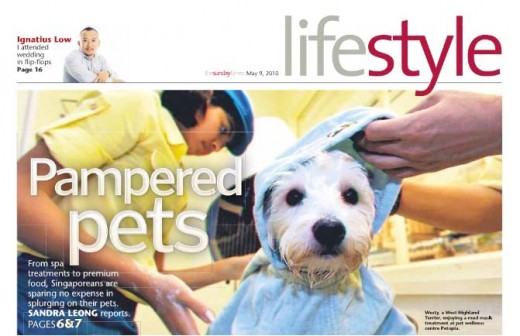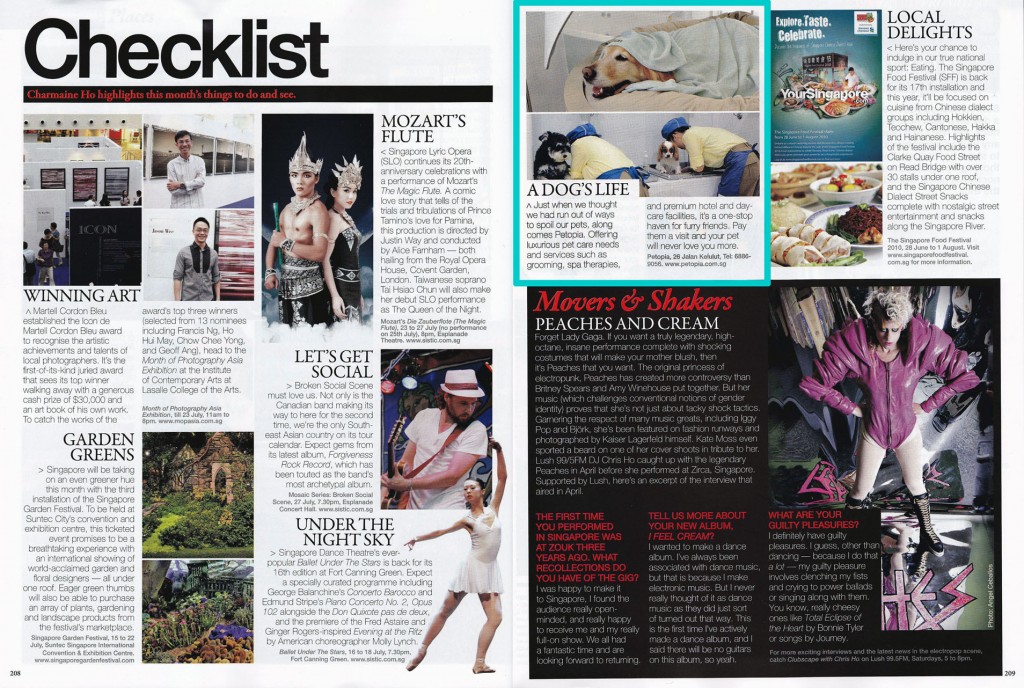
By Sandra Leong
Pets in Singapore are being spoilt like never before with spas, daycare, fancy food and cafés just for them.
Amid candles, soothing piped music and the scent of camomile, lavender and lemongrass, two uniformed therapists are fussing over one rather nonplussed-looking customer.
Westy, a one-year-old West Highland Terrier, is luxuriating in a mud mask. A soothing layer of clay, comprising 75 different types of minerals, has been lovingly slathered onto his white furry body. The therapists coax him into a bathrobe. With the help of a machine that emits sleep-inducing infrared rays, they then massage him into a 20-minute nap.
Owner Laura Yeo, a 33-year-old flight attendant, is watching from the other side of a glass panel. She says this is the second time in a month that Westy, who has sensitive skin, has undergone the S$128 treatment.
“You can tell from his face how much he is enjoying it,” she says, looking pleased, then adding with a laugh, “Sometimes a dog’s life is better than a human’s life, don’t you think?”
Newly opened pet holistic wellness centre Petopia and its range of pet-indulgent services represent the peak of Singapore’s thriving pet industry. According to estimates from the Pets Enterprises & Traders Association Singapore, the pet food and pet care market here was worth S$186 million last year, up from S$181 million in 2008. At last count, there were 277 pet shops here, says the Agri-food & Veterinary Authority.
At Petopia’s premises off Yio Chu Kang Road, dog owners can send their beloved companions for styling (“Not grooming, it sounds like we are barbers,” says managing director Marcus Khoo); spa and healing sessions (reiki or moxibustion therapy); and hotel and daycare services (webcam “chats” are facilitated for owners who travel overseas sans their pets).
Prices are not cheap, up to S$250 for, say, the “creative styling” of a large dog.
Khoo, 37, a former army regular, says, “There is still a small number of people who think dogs are dogs, just give them the basics. But others now think these luxuries are necessities. They don’t talk about prices. They just want the best.”
The Singapore love affair with pets, and with dogs particularly, is gaining in fervour. Last year, the Agri-food & Veterinary Authority issued more than 58,000 dog licences, required for canines above three months old. It’s a big increase from 2000, when more than 33,000 licences were issued. It does not license other varieties of pets.
The profile of local pet owners, which used to be mature families seeking an addition to their home, has changed. Singles and young, childless couples are also opting for furry friends, whom they see as a balm to a sometimes lonely urban existence.
“We see a lot of Dinks — double income, no kids,” says Khoo. “I have seen couples married for five years who expressedly say they don’t want kids because the dogs are their children. They refer to their pets as ‘my son and my daughter’.”
The common term, he adds, is “furkids”.
Owners like Yeo, who spend about S$500 to S$800 a month on food, wellness treatments and boarding on dogs like Westy, are not unusual. Marilyn Mok, 38, who is single, readily admits that, “my pets are my indulgence.”
The senior manager of compensation and benefits has four dogs (three corgies and a shih tzu) and three cats (two domestic shorthairs and a persian) who live with her family in a semi-detached house in Seletar Hills. Apart from food, which comes up to “a few hundred a month”, she has to pay the medical bills for Mocha, her eight-year-old dog who suffers from hip dysplaxia and other problems.
This is despite the fact that she is allergic to animals, breaking out in rashes every few months. “But they are my babies. I won’t give them away for anything,” she protests.
Personal assistant Andra Hu, 26, who owns Rudolf, a Japanese breed known as a shiba inu, along with American cocker spaniel Goofy with her 36-year-old husband, treats her dogs to gourmet delicacies such as Kobe beef, foie gras and crocodile meat on special occasions.
“I don’t eat foie gras so it was my share that we packed home for them,” she says. “Imagine the expression on the waiter’s face when I said it was for my dogs.”
She also holds birthday or “barkday” parties for them. Asked if the dogs are substitute children, she says: “We do not have immediate plans to have a child of our own . . . it’s too much commitment for us.
“Just imagine controlling a straying child. But with our dogs, they can’t do anything if the main door is locked.”
Project executive Nadia Jaffar, 25, says she feels the same connection with her five Siberian cats. She spends about S$300 a month on them, feeding them premium pet food, boiled chicken and raw meat.
“A lot of people think cats are aloof and not people-oriented. But once you spend time with them, they do respond to you.”
“Part of the family,” is how Petas president Yap Seng Teck describes the new attitude towards pets.
“Owners are more willing to spend on grooming, pet cafés, spas, training and wellness services,” he says. And the industry is cashing in, with more “specialised services” popping up, he adds.
One example is Pet Lovers Centre, which now has 36 stores island-wide, compared to just nine stores in 2003. Managing director Ng Whye Hoe says there is growing demand for products that appeal to “the ‘pet parent’ instinct in pet owners”, such as snacks that look like human food.
Walk into any pet shop and you will spot premium pet food items and supplements that are good enough for humans, such as Omega 3 salmon sashimi snacks and caviar treats. Pet food from upscale brand Honest Kitchen cost about S$200 for a 10-pound pack of turkey meat. That amount will last half a month for a large-sized dog and two to three months for a small dog, says Mr Philip Kuan, owner of premium pet product company Roots Technologies.
Over the past five years, there has been an increase in demand for high-end food products, with business growing by 5% to 8% year on year, he says. Other indulgences that are now available include expensive toys, designer pet wear and strollers for dogs.
Pet Lovers Centre has introduced a range of pet toiletries for “high net worth pets”. Called Isle Of Dogs, it uses royal jelly as a base to improve the skin and coats of animals. The demand for better pet-related services has also supported businesses such as K9 Kulture at Turf City, which touts itself as a lifestyle facility for dogs with daycare services, a swimming pool, obedience classes, a pet cafe and doggie bakery.
At the daycare service, which costs S$30 to S$50 a day, owners drop off their dogs at K9 Kulture, where they get to run off their energy and learn how to behave in canine company. There is a “school bus” for dogs that need transport to and from daycare.
It is “indulgence in a necessary way”, says owner Josiah Tan, 41, adding that like children, dogs too need the best education. His clients, he says, are mostly well-educated yuppies who “know the importance of sending their dogs to school”.
The menu at his pet cafe includes dishes such as meatballs and sweet potato. The premises can also be booked for birthday parties, where cake is served to the dogs. Over the past five years, revenue at K9 Kulture has grown by 400%, he says.
But amid this animal madness, one wonders: Are Singaporeans spoiling their pets? Surely there is no need to spend all that money on luxuries when just the basics will do?
Civil servant and dog owner Elsa Yeo, 40, spends S$400 to S$500 a month on her miniature schnauzer and four border collies.
She says, “When people ask, I tell them the love for my dogs is the same as the love for your kids. They give you loyalty and unconditional love. You can’t compare that in terms of money.”
Veterinarian in private practice, Hsu Li Chieh, warns that, like humans, pampered pets which are overfed and underworked might suffer from obesity and are more susceptible to disease and premature death. But with resources such as the Internet, pet owners these days seem better equipped to provide proper care.
The Society for the Prevention of Cruelty to Animals is also worried. Its executive officer Deirdre Moss says, “Unfortunately, with the escalation in the number of pet shops and breeding farms, we assume impulse buying is quite common.”
Subsequent abandonment is a problem.
The charity takes in between 80 and 90 lost dogs every month, of which 50% remain unclaimed following advertisements in the press.
The fate of these animals, then, will be a far cry from going for spa treatments and birthday parties.





